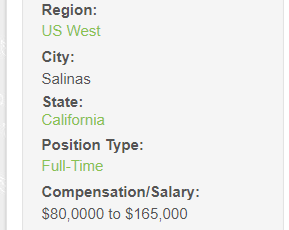Hi Friend, Employer and Customer,
As you may have heard, there are various states (listed below) across the country who have enacted new laws that are requiring job postings to show a compensation range for jobs within their respective states. This is part of a growing trend of “Salary Transparency Laws” being adopted by states across the country.
This is going to be an adjustment for quite a few employers. This does not have to be tough.
The good news is that there are quite a few studies that show positive benefits with job seekers.
Our recommendation is to use a real and realistic compensation range for the respective job ads. This included both salary and hourly.
An example:  A sales position may range from $80,0000 to $165,000. For each job posting, our site has a field where the compensation range appears for the job seekers.
A sales position may range from $80,0000 to $165,000. For each job posting, our site has a field where the compensation range appears for the job seekers.
We suggest that your HR Department and the applicable hiring manager, be prepared to explain the range to the candidate(s), and possibly with members of the sales team.
NOTE: Some positions will have wider compensation ranges than others. Again, we suggest keeping it realistic.
Your Responsibility: (updated 1/12/23)
It is your responsibility to know your state’s laws and to comply with those laws.
Below is a list of states where we are presently aware of an applicable Pay Transparency law. We are providing this information as a value-added service. We are not responsible for your company’s knowledge and/or compliance with these or any laws.
California - Employers (15+ employees) must disclose pay ranges in job postings https://leginfo.legislature.ca.gov/faces/billNavClient.xhtml?bill_id=202120220SB1162
Colorado - All Employers must disclose pay ranges in job postings
https://cdle.colorado.gov/equalpaytransparency
Washington - Employers (15+ employees) must disclose pay ranges in job postings
Connecticut - Employers must disclose salary ranges upon a candidate’s request
Maryland - Employers must provide pay ranges when candidates request them and prohibits employers from asking about previous salary history.
https://www.dllr.state.md.us/labor/wages/equalpay.shtml
Nevada - Employers must disclose a salary range after the first interview. Further, employees are also entitled to salary ranges for transfers and promotions.
https://www.nevadaemployers.org/spotlight-pay-transparency-in-nevada/
New Jersey - Employers may not screen employees based on salary history or require a specific range to satisfy a minimum or maximum criteria. Specific to Jersey City, the Ordinance Amending Chapter 148 requires employers to disclose a job’s salary range and benefits. This also applies to promotion or transfer opportunities.
New York - Employers must disclose salary ranges and benefits before a candidate is hired.
Similar to the Jersey City law, these laws only apply to either NYC or Ithaca. That means if a candidate doesn’t have a job in either of these cities, the law won’t apply.
Ohio - Cincinnati and Toledo - Employers cannot request salary history and must provide salary ranges after a job offer has been made
Rhode Island - Employers must provide a salary range if a candidate requests it. And this will also apply to transfers and promotions.
http://webserver.rilin.state.ri.us/BillText/BillText21/SenateText21/S0270A.pdf
Related stories:
Here are all the new salary transparency laws going into effect in 2023. Story by CNBC

